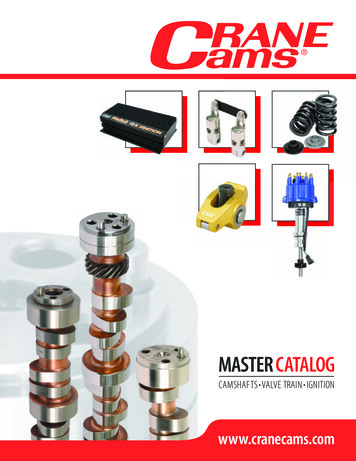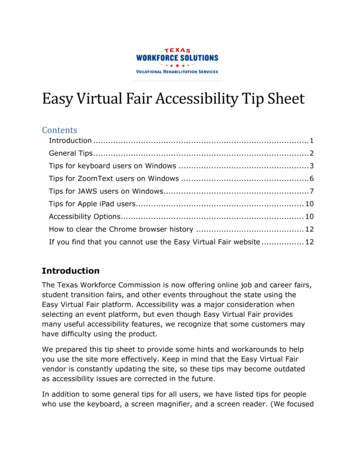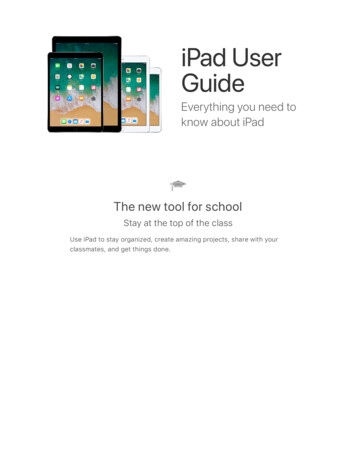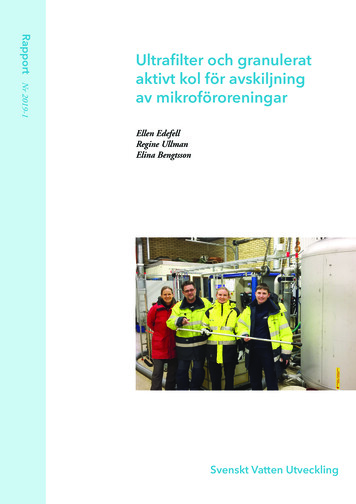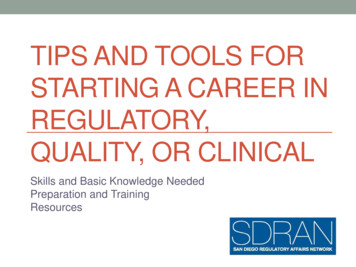
Transcription
TIPS AND TOOLS FORSTARTING A CAREER INREGULATORY,QUALITY, OR CLINICALSkills and Basic Knowledge NeededPreparation and TrainingResources
2Overview Minimum skills/knowledge needed Career preparation tips Resume, Networking, Volunteering,Training/education, Interviewing Mentoring and internships Tools and resources
3Minimum Entry-Level Skills Needed Key skills: Writing, Interpersonal and communicationskills, Project management, Attention to detail, Ethics Strong oral/written communication skills Write/edit technical documents; detail oriented Organizational skills to manage multiple, changingpriorities Handle/prioritize detailed tasks Manage projects, meet deadlines; work on cross-functional teams Review/analyze relevant data/information Think analytically/strategically Research/locate relevant information
4New to Regulatory, Clinical, Quality Education: Science, Engineering (Clinical:also Nursing, other Medical Professions) Not usually first industry job QC may be first job Bridging work experience: Quality,Clinical/Medical, Regulatory, Toxicology,Manufacturing, Project Management Job titles: Coordinator, Associate,Specialist
5What does Regulatory Professional Do? Understand/interpret/apply laws,regulations Monitor/report new regulatory requirements Advise company on regulatory compliance Prepare/manage regulatory submissions,communications with health authorities Maintain regulatory files, submission quality Participate on product development teamsto develop regulatory strategies
6
7Regulatory Basic Knowledge Needed Regulatory, medical, scientific terminologyRegulatory agency (structure, processes, personnel)Principles/requirements of device, drug lawsProduct lifecycle development: clinical, nonclinical,quality requirements (SOPs, GXPs) Submission types, requirements Electronic submission techniques Ethical concerns in human research, medical productsrisk/benefit, public health reportingFrom RAPS Regulatory Affairs Professional Development Framework
8RA Entry Level Responsibilities Maintain regulatory filesBe current with regulatory procedures/changesRespond to RA information requestsAssist in SOP development/reviewInvestigate regulatory history of similar productsResearch submission requirements/optionsAssist monitoring project timelinesOrganize materials from nonclinical, clinical studiesCoordinate/assist submission preparationOversee quality control of regulatory documentsParticipate on product teamsCompose routine correspondence to regulatory agencyAssist in preparing for meetings with regulatory agencyFrom RAPS Regulatory Affairs Professional Development Framework
9What does Clinical Professional Do? Safeguard clinical trial patient safetyEnsure clinical data qualityEnsure ethical conduct of clinical trialsEnsure regulatory complianceEnsure research projects completed on time, on target, on budgetPrepare/manage adverse event submissionsMaintain regulatory files, ensure clinical trial file qualityParticipate on product development teams to develop clinical strategiesCoordinate with clinical sites, monitors, CROs, DSMBs, clinicalinvestigators Conduct internal/external training sessions Manage clinical trial databases Conduct internal/external GCP auditsFrom ACRP Association of Clinical Research Professionals DevelopmentPathway
10New to Clinical Affairs Education: Science, Nursing, Other MedicalProfessions Not usually first industry job Bridging work experience: Medical, Regulatory,Quality, Project Management Understand healthcare product development,clinical uses Responsibilities: coordinate, support technical,scientific clinical activities Job titles: Coordinator, Associate, Specialist
11Clinical Basic Knowledge Needed Regulatory, medical, scientific terminology Clinic/Hospital Environment (structure, processes, personnel)Principles/requirements of device, drug lawsProduct lifecycle development: clinical research,nonclinical, quality requirements (SOPs, GXPs)Submission, clinical document types, requirements(health authorities, IRBs, DSMBs)Electronic data capture, managementGood documentation practicesFrom ACRP Association of Clinical Research Professionals Development Pathway
12Clinical Entry Level Responsibilities Maintain, review, audit case report forms, clinical trial files Database entry Stay current with regulatory procedures Assist in SOP, CRF, informed consent development, review Coordinate with clinical sites Assist project timeline monitoring Organize documents/records from clinical sites Assist adverse event or clinical report preparation Oversee quality control of regulatory documents Ensure ethical treatment of clinical study subjects Participate in risk management activitiesFrom ACRP Association of Clinical Research Professionals Development Pathway
13New to Quality Assurance Education: Science, Engineering Not usually first industry job (QC may be first job) Bridging work experience: Clinical, Regulatory,Manufacturing, Toxicology, Project Management Understand healthcare product development Responsibilities: coordinate/support technical,scientific quality activities Job titles: Coordinator, Associate, Specialist
14Quality Basic Knowledge Needed Regulatory, medical, scientific terminology Regulatory agency (structure, processes, personnel) Principles/requirements of device, drug laws Product lifecycle development: clinical, nonclinical,quality requirements (SOPs, GXPs) Quality system requirements (cGMP, QSR, ISO, ICH) Electronic documentation management Good documentation practices Basic audit techniques
15Quality Entry Level Responsibilities Maintain department files Stay current with quality procedures Assist in SOP development, review Collect, review, analyze quality data On-going compliance evaluation (or assessment) Assist in internal audits Track product events, complaints, recalls Oversee quality control of quality records, documents Present quality data to project teams, management Participate in risk management activities
16CAREER PREPARATION SUMMARY Revise resume to show transferable skills Update LinkedIn profile Networking, Volunteering Mentoring, Internship, Training Related work experience (e.g., clinical,QA, project management) Prepare for interview
17Preparation within Your Company Talk with supervisor about long-term goals Try to transfer within your company Talk with your manager or HR departmentabout your interest Volunteer to help Some companies have cross-trainingprograms for short-term assignments orpart-time work in other departments
18Resume Preparation For career change, include Objective Focused on job applying for; not just any job Bullets, not paragraphs Readability important; simple format Tailor to specific job with keywords List accomplishments, include numbers Highlight relevant, transferable skills/experience For example: Project management, Report writing List relevant courses, training Show what you know about regulations, therapeutic area Other ways to show commitment to career change:memberships, certification, classes/seminars
19Networking Use your connections Be your own advocate Describe yourself professionally Describe opportunities you are interested in Prepare “elevator pitch” or sentence about yourself Short version, Longer version, Audience specific Take advantage of networking opportunities at meetings Meet other professionals at local programs; Ask forintroductions Network on LinkedIn
20Volunteering Great way to network; meet other professionals Regulatory SDRAN - volunteer on committee, speak at program RAPS – write article for Focus, speak at program, joinplanning committee Quality ASQ - volunteer on committee, speak at program Clinical SDCRN - volunteer on committee, speak at program ACRP - write article, speak at program, join planningcommittee
21Training to Improve Knowledge,Credentials Educational programs/seminars/webinars SDRAN, OCRA, RAPS, ASQ, ACRP, SDCRNprograms University classes (certificates, mastersprograms) Certifications RAPS RAC - US, EU exams (SDRAN StudyGroup) ACRP Clinical Research Associate certification SDCRN Study Groups ASQ – CBA, CMQ/QE, CPGP, CQA, CQE, etc. FDA website: CDER, CDRH Learn
22Interview Preparation Find what skills most important for position;show your experience fits Describe how you handled related situation Research company products, competitors,management, etc. Practice interviewing Be confident, professional Formulate S.T.A.R. (Situation, Task, Action,and Result) responses
23Interviewing Tips Don't have an attitude Dress professionally Watch body language Be prepared (do homework about position,company, typical questions) Focus Don't talk money Be yourself Follow up with thank you email
24Phone Interview Tips Typical phone interview 20-30 minutes Print copy of resume, cover letter, job posting Prepare list of questions Assemble talking points, company research Record professional voice mail message on phone Answer with your name Have water available Use landline if possible; if using cell phone, have chargerhandy Eliminate distractions Have calendar handy to schedule follow up interview Ask about next steps; send thank you
25Skype Interview Tips Look at camera, not screen Dress professionally like for in-person interview Quiet location with good lighting; ready early Check internet connection and familiarize yourself with Skype’s features in advance; practice with friendClose other programs on computerSmile to bring energy/excitement to your voicePay attention to body language; good posturePause before answering in case of lagSame follow up as phone interview
26SDRAN Mentoring Career development advice fromexperienced professionals Further develop career goals Resume critique Identify skill/training gaps Describe different jobs Help with networking
27SDRAN Internship Work with industry to provide internshipopportunities in regulatory, quality, clinical, projectmanagement Meaningful short term work experience Learn from experienced manager May provide experience to qualify for entry-levelposition Try out new career path
28Where are the Jobs? Industry (Biotech, medical devices,pharmaceutical) Government (FDA headquarters or field office) Contract Research Organization (CRO) Various locations, positions including regulatory,quality, and clinical Hospital or university Contract or temporary job Transfer within company
29Summary Prepare for career change: Resume update Interviewing skills Training/education Networking/volunteering Following are resource slides
30Helpful Tools and ResourcesSan Diego Regulatory Affairs Network (SDRAN)www.sdran.org Monthly educational programs on regulatory topics Mentoring – new mentees accepted annually Internships – new opportunities posted as available Job listings posted regularly RAC study groups (every summer) Networking at programs, other events Resource links Volunteer on committee Join SDRAN LinkedIn Group
31Helpful Tools and ResourcesRegulatory Affairs Professionals Society(RAPS) www.raps.org(some of these links may only be available to RAPS members) Education, training Certification (RAC) Publications including Fundamentals of RegulatoryAffairs books Career information http://www.raps.org/your-career.aspx Job listings; Career fairs Salary Calculator tion-report/salary-calculator.aspx
32Helpful Tools and Resources More RAPS Tools: Regulatory Affairs Professional Development DF Framwork Whitepaper.pdf The Pipeline for Regulatory rt May11 Talent Pipeline.pdf 2012 Scope of Practice & Compensation Report for the RegulatoryProfession ationreport.aspx Strategies for your Career: Finding YOUR Pathway into Regulatory(free esources/viewdocument?DocumentKey 24f0a64b-0cfe-474c-bfe3-5b42a13d4008 Professional Levels ls.aspx
33Helpful Tools and ResourcesLinkedIn www.linkedin.com Update your profile Your career advertising space Professional photo Add connections Join Groups, post discussions, comments to show yourexpertise, ask for recommendations Search Jobs, People, Companies Network; prepare for interview
34University Programs SDSU Regulatory Affairs program regaffairs.htm Advanced Certificate in Regulatory Affairs Master of Science in Regulatory Affairs USC Regulatory Affairs program (online)http://regulatory.usc.edu/ Masters in Regulatory Science Doctorate in Regulatory Science UCSD Extension (many classes m?vAction certDetail&vCertificateID 79&vStudyAreaID 4 Regulatory Affairs Essentials Certificate Regulatory Affairs for the Biomedical Industry
35More University Programs CSUF Clinical Trials Project Management onaldevelopment/Certificates/Clinical-Trials CSUDH Quality Assurance program BS in Quality Assurance http://www.csudh.edu/bsqa/ MS in Quality Assurance http://www.csudh.edu/msqa/ Life Science Certificate Programswww.extension.ucsd.edu Clinical Regulatory Affairs and Clinical Affairs umanServices/HealthSciences/Programs.html.
36Job Listing Boards Medzilla http://www.medzilla.com/ Biospace http://www.biospace.com/jobs FierceBiotech http://www.fiercebiotech.com/jobs/ Indeed http://www.indeed.com/ Monster http://www.monster.com/ Simply Hired http://www.simplyhired.com/ Glass Door http://www.glassdoor.com/index.htm CareerBuilder http://www.careerbuilder.com/
RA Entry Level Responsibilities Maintain regulatory files Be current with regulatory procedures/changes Respond to RA information requests Assist in SOP development/review Investigate regulatory history of similar products Research submission requirements/options Assist monitoring project timelines Organize materials from nonclinical, clinical studies







